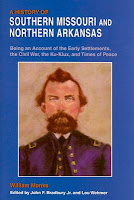 Working in a library, I am blessed to have the opportunity to review so many books. There are some books that should receive merit & credit even after their debut. One book that I would like to highlight is A History of Southern Missouri and Northern Arkansas : being an account of the early settlements, the Civil War, the Ku-Klux, and times of peace by William Monks. It is edited and has an introduction by John F. Bradbury, Jr. and Lou Wehmer.
Working in a library, I am blessed to have the opportunity to review so many books. There are some books that should receive merit & credit even after their debut. One book that I would like to highlight is A History of Southern Missouri and Northern Arkansas : being an account of the early settlements, the Civil War, the Ku-Klux, and times of peace by William Monks. It is edited and has an introduction by John F. Bradbury, Jr. and Lou Wehmer. This book gives a graphic glimpse of tough people in tough times.
For those who are not faint of heart, I encourage you to check out the book. Why do I say the phrase "faint of heart?" Well…there are Civil War photos that could mess with your mind, such as bushwhackers cutting out a man's heart after a raid in Ozark County, Missouri.
If you ever get confused on your loyalties of which side was on the right? This will add to the conundrum.
Nevertheless, I will let you read a small excerpt from this graphic book. If you do not have access to a library, it can also be read on the Internet for free at Google Books at this link at: http://books.google.com/books?id=z3MUAAAAYAAJ&printsec=frontcover#v=onepage&q=&f=false
One a slightly lighter side
The following article is a glimpse of Ozark life in Marion County, Arkansas. When the author refers to The Nation, please refer to my past blog of the Old Ozark Plateau Map...Here. He was talking about the Cherokee Nation in Baxter & Marion Counties in Arkansas.
Enjoy.
Indians Chase a Sheriff Ten Miles.
The good people, generally, of the county were terrorized and afraid to raise their voices against them, and it became a question as to whether they had a man in the county who had the courage to attempt their arrest. They made it a question in the next election, to elect a man that would make the arrest, if such a man could be found in the county. There was a man living in the county by the name of Brown, who was a cousin of the Cokers, and he told the people that if they would elect him, he would arrest them or they would kill him. He was elected by a large majority, and, after he had qualified, took charge of the office. The first time the Cokers came into the settlement, he summoned two men, thought to be brave, who pledged themselves that if it became necessary they would die for him. He then went to the house of one of the Coker family where the Cokers were staying, and on his arrival found the two Coker brothers sitting in chairs in the yard. He was within, some thirty feet of them before they saw him. Their guns were sitting near them, and they seized them; but before they could present them Brown had his revolver cocked and leveled at one of their heads, and told him not to attempt to raise his gun or he would kill him. Coker turned his back to him with his gun on his shoulder, secretly cocked it, and leveled it upon Brown as near as possible without taking it from his shoulder and fired, missing his aim. About the same time Brown discharged his revolver at Coker and made a slight scalp wound. The other Coker threw his gun upon Brown and fired, killing him instantly. The two men who were acting as a posse for the sheriff turned and fled, leaving Brown lying dead on the ground. After the shooting the Cokers fled to the Nation and remained there.
Works Cited:
Monks, William. A History of Southern Missouri and Sorthern Arkansas. Ed. John F. Bradbury Jr. and Lou Wehmer. Fayetteville, AR: University of Arkansas Press, 2003.
Monks, William. A History of Southern Missouri and Sorthern Arkansas. West Plains, MO: West Plains Journal Company, 1907. Google Books. 12 Dec. 2009 http://books.google.com/books?id=z3MUAAAAYAAJ.

No comments:
Post a Comment